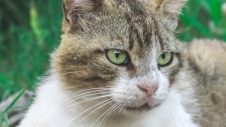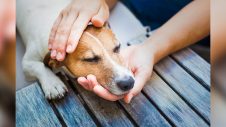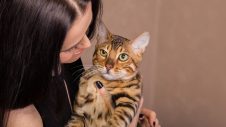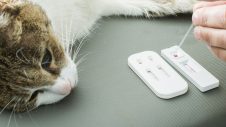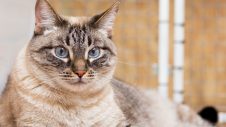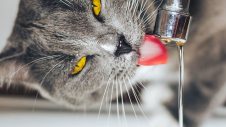 While there’s no single reason cats may supplement their diets with grass, it is generally not a concern. However, if you do notice your cat eating lots of grass, ensure you seek help from a vet.
While there’s no single reason cats may supplement their diets with grass, it is generally not a concern. However, if you do notice your cat eating lots of grass, ensure you seek help from a vet.There’s a myth in the pet care community that the only reason cats eat grass is to induce vomiting when they have an upset stomach. According to Dr Emily Payne, this may not necessarily be true when it comes to your cat.
“It would be concerning if your cat was vomiting every time it ate grass,” she says. “If it’s once a week or more frequently, then it should be checked by your vet. But if your cat eats grass and doesn’t vomit then it isn’t an issue.”
Your cat could be seeking health benefits
Your cat may graze on grass to boost its vitamin levels. Grass contains a nutrient called folic acid, which helps move oxygen through the blood stream. Some experts theorise that eating grass may also help ease sore throats, while others believe cats do it simply because they enjoy the taste and texture.
To quicken its bowel movements
Your cat has predatory instincts and, as a result, it hunts small animals such as mice and birds. These animals have little bones, fur and feathers, not all of which can pass through a cat’s digestive tract with ease. For this reason, cats may use grass as a laxative to help with digestion.
To induce vomiting
As cats lack the enzymes to break down too much grass, they may eat it to induce vomiting and clear out indigestible material (such as fur and feathers) from their stomachs. If your cat’s predatory habits concern you, see this article on how to stop your cat killing birds .
How to help
Dr Payne recommends providing your cat with appropriate greenery to eat, such as cat grass or catnip so it won’t graze on anything that may have been sprayed with chemicals or fertilisers.
“If your cat eats other grass, make sure it hasn’t been treated with anything,” she says.
If you have any concerns about your cat eating grass, or its diet in general, make sure you seek advice from your local Greencross Vets .

 Greencross Vets
Greencross Vets 
